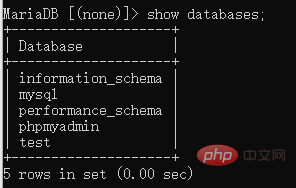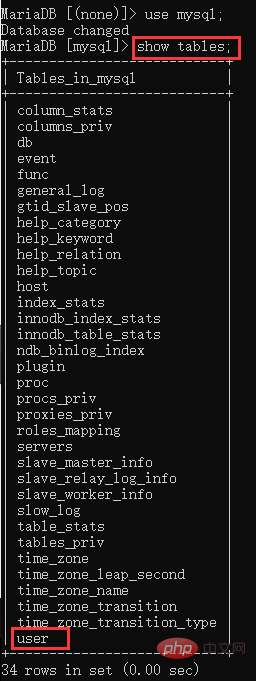 Database
Database
 Mysql Tutorial
Mysql Tutorial
 Detailed step-by-step introduction to changing the password of mysql database
Detailed step-by-step introduction to changing the password of mysql database
Detailed step-by-step introduction to changing the password of mysql database
This article brings you the detailed steps on changing the password of the MySQL database. It has certain reference value. Friends in need can refer to it. I hope it will be helpful to you.
Recently I was looking at database-related things. After reinstalling the computer, the previous configuration was gone. In order to facilitate the direct configuration of the XAMPP one-click installation package, I encountered the following small problems during the configuration process. . Although the problem is not big, I still want to record it so that I don’t know how to deal with the same problem in the future.
1. Apache shutdown unexpectedly startup error
The error displayed when xampp starts is:
9:52:41 [Apache] Attempting to start Apache app...
9:52:41 [Apache] Status change detected: running
9:52:42 [Apache] Status change detected: stopped
9:52:42 [Apache] Error: Apache shutdown unexpectedly.
9:52:42 [Apache] This may be due to a blocked port, missing dependencies,
9:52:42 [Apache] improper privileges, a crash, or a shutdown by another method.
9: 52:42 [Apache] Check the "/xampp/apache/logs/error.log" file
9:52:42 [Apache] and the Windows Event Viewer for more clues
This is more common The problem of ports 80 and 443 being occupied is as follows:
(1) Port 443 is occupied:
Configure in /xampp/apache/conf/extra/httpd-ssl.conf Change listen 443 to 444 in the file (this port can be defined by yourself)
(2) Port 80 is occupied, apache cannot listen to port 80
In /xampp/apache/conf/extra/ httpd.conf Change Listen 80 to 88 (customizable); if vhosts is configured, please change the port in httpd-vhosts.conf to 88 (the same port number as above)
Link description
2. phpmyadmin access denied
The error when phpmyadmin access is denied is:
phpMyAdmin tried to connect to the MySQL server, but the server refused the connection. You should check the host, username, and password in the configuration file and confirm that the information matches the information given by the MySQL server administrator.
Cause of the error:
The root password in mysql.user was modified, which resulted in inconsistency with the password in the phpMyAdmin configuration file, so the connection could not be made.
Solution:
Modify $$cfg['Servers'][$i]['password']='yourpassword'; // set above for root in ../phpMyAdmin/config.inc.php Password
3. Mysql changes the initial password
(1) Win R and enter cmd to enter the cmd command prompt, enter mysql -uroot -p

(2) If "mysql is not an internal or external command, nor an operable program or batch file" appears at this time, it means that the mysql configuration path is not placed under the environment variable. You need to put the path containing the mysql.exe and mysqld.exe files under the system environment variable;
(3) Enter the database password. If the login is successful, the following display will appear:

(4) After successful login, enter show databases; you can see all databases

(5) Enter use mysql; select the mysql database, which is where the user name is saved

(6) show tables to view all tables, you will find that there are A user table, which stores account information such as user names, passwords, permissions, etc.

(7) Enter select user,host,password from user; to view account information.

(8) To change the root password, enter update user set password=password('123456') where user='root' and host=' localhost';

(9) Check the account information again, select user,host,password from user; You can see that the password has been modified.

(10) Exit the command line, restart the mysql database, and try to log in with a new password.
This completes the modification of the mysql database. The above are some minor problems encountered when configuring mysql. I will record them here.
This article ends here. For more knowledge about MySQL, you can pay attention to the MySQL Tutorial column on the php Chinese website! ! !
The above is the detailed content of Detailed step-by-step introduction to changing the password of mysql database. For more information, please follow other related articles on the PHP Chinese website!

Hot AI Tools

Undresser.AI Undress
AI-powered app for creating realistic nude photos

AI Clothes Remover
Online AI tool for removing clothes from photos.

Undress AI Tool
Undress images for free

Clothoff.io
AI clothes remover

Video Face Swap
Swap faces in any video effortlessly with our completely free AI face swap tool!

Hot Article

Hot Tools

Notepad++7.3.1
Easy-to-use and free code editor

SublimeText3 Chinese version
Chinese version, very easy to use

Zend Studio 13.0.1
Powerful PHP integrated development environment

Dreamweaver CS6
Visual web development tools

SublimeText3 Mac version
God-level code editing software (SublimeText3)

Hot Topics
 1662
1662
 14
14
 1419
1419
 52
52
 1311
1311
 25
25
 1261
1261
 29
29
 1234
1234
 24
24
 MySQL's Role: Databases in Web Applications
Apr 17, 2025 am 12:23 AM
MySQL's Role: Databases in Web Applications
Apr 17, 2025 am 12:23 AM
The main role of MySQL in web applications is to store and manage data. 1.MySQL efficiently processes user information, product catalogs, transaction records and other data. 2. Through SQL query, developers can extract information from the database to generate dynamic content. 3.MySQL works based on the client-server model to ensure acceptable query speed.
 Laravel Introduction Example
Apr 18, 2025 pm 12:45 PM
Laravel Introduction Example
Apr 18, 2025 pm 12:45 PM
Laravel is a PHP framework for easy building of web applications. It provides a range of powerful features including: Installation: Install the Laravel CLI globally with Composer and create applications in the project directory. Routing: Define the relationship between the URL and the handler in routes/web.php. View: Create a view in resources/views to render the application's interface. Database Integration: Provides out-of-the-box integration with databases such as MySQL and uses migration to create and modify tables. Model and Controller: The model represents the database entity and the controller processes HTTP requests.
 How to start mysql by docker
Apr 15, 2025 pm 12:09 PM
How to start mysql by docker
Apr 15, 2025 pm 12:09 PM
The process of starting MySQL in Docker consists of the following steps: Pull the MySQL image to create and start the container, set the root user password, and map the port verification connection Create the database and the user grants all permissions to the database
 MySQL and phpMyAdmin: Core Features and Functions
Apr 22, 2025 am 12:12 AM
MySQL and phpMyAdmin: Core Features and Functions
Apr 22, 2025 am 12:12 AM
MySQL and phpMyAdmin are powerful database management tools. 1) MySQL is used to create databases and tables, and to execute DML and SQL queries. 2) phpMyAdmin provides an intuitive interface for database management, table structure management, data operations and user permission management.
 Solve database connection problem: a practical case of using minii/db library
Apr 18, 2025 am 07:09 AM
Solve database connection problem: a practical case of using minii/db library
Apr 18, 2025 am 07:09 AM
I encountered a tricky problem when developing a small application: the need to quickly integrate a lightweight database operation library. After trying multiple libraries, I found that they either have too much functionality or are not very compatible. Eventually, I found minii/db, a simplified version based on Yii2 that solved my problem perfectly.
 MySQL vs. Other Programming Languages: A Comparison
Apr 19, 2025 am 12:22 AM
MySQL vs. Other Programming Languages: A Comparison
Apr 19, 2025 am 12:22 AM
Compared with other programming languages, MySQL is mainly used to store and manage data, while other languages such as Python, Java, and C are used for logical processing and application development. MySQL is known for its high performance, scalability and cross-platform support, suitable for data management needs, while other languages have advantages in their respective fields such as data analytics, enterprise applications, and system programming.
 Laravel framework installation method
Apr 18, 2025 pm 12:54 PM
Laravel framework installation method
Apr 18, 2025 pm 12:54 PM
Article summary: This article provides detailed step-by-step instructions to guide readers on how to easily install the Laravel framework. Laravel is a powerful PHP framework that speeds up the development process of web applications. This tutorial covers the installation process from system requirements to configuring databases and setting up routing. By following these steps, readers can quickly and efficiently lay a solid foundation for their Laravel project.
 MySQL for Beginners: Getting Started with Database Management
Apr 18, 2025 am 12:10 AM
MySQL for Beginners: Getting Started with Database Management
Apr 18, 2025 am 12:10 AM
The basic operations of MySQL include creating databases, tables, and using SQL to perform CRUD operations on data. 1. Create a database: CREATEDATABASEmy_first_db; 2. Create a table: CREATETABLEbooks(idINTAUTO_INCREMENTPRIMARYKEY, titleVARCHAR(100)NOTNULL, authorVARCHAR(100)NOTNULL, published_yearINT); 3. Insert data: INSERTINTObooks(title, author, published_year)VA



